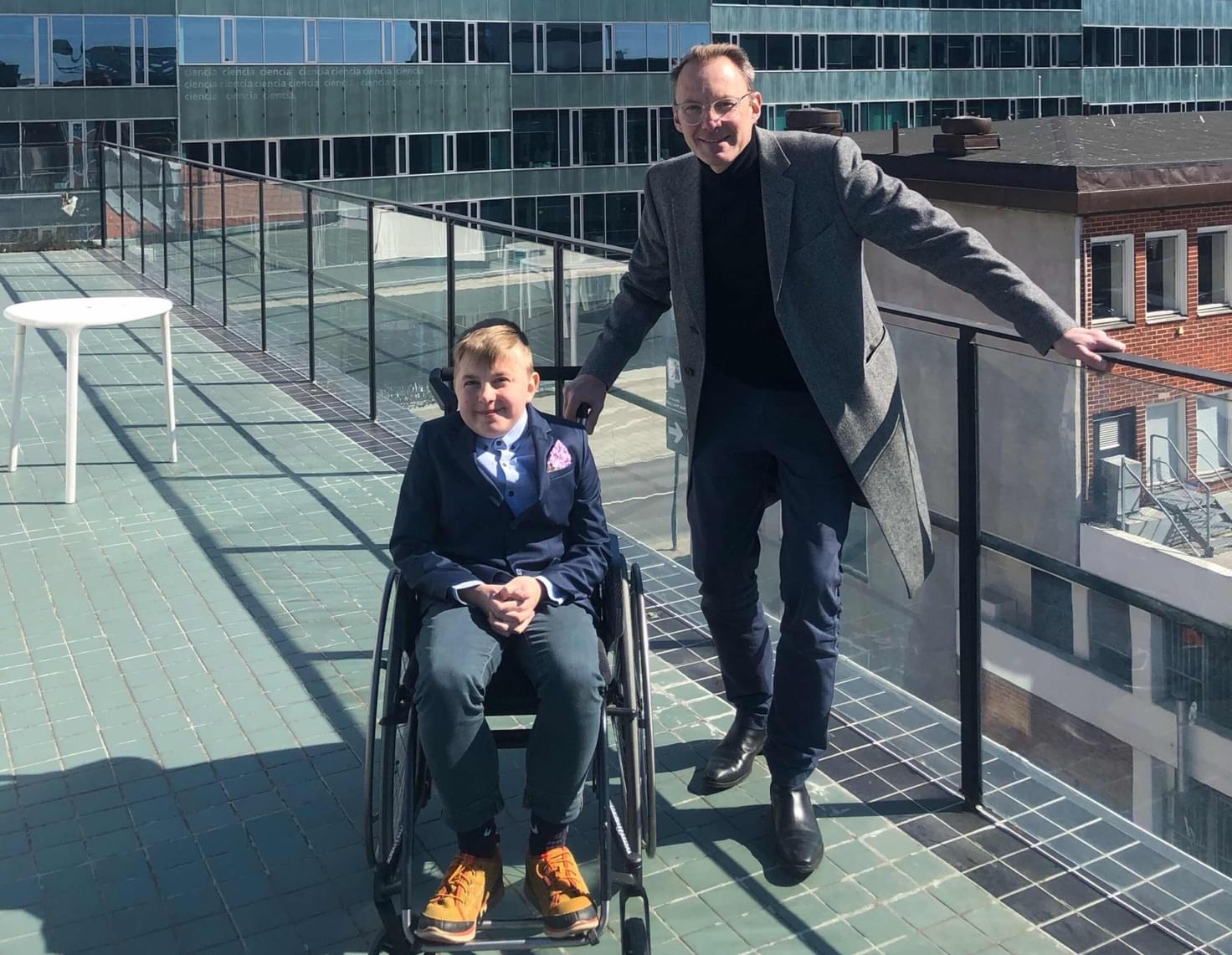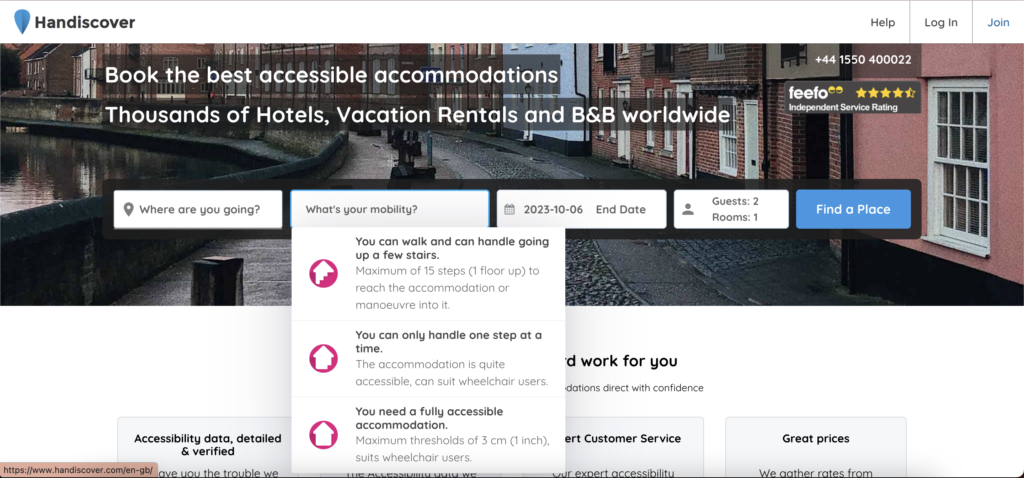
Words by Abi Scaife
Much of the world remains inaccessible for people with disabilities. Finding accommodation that is fully adapted to wheelchair users is a minefield - and just try communicating your extra needs when there’s a language barrier.
The sad truth is that most spaces simply aren’t designed with disabilities in mind. Even in 2023, businesses and individuals rarely understand what is required to achieve inclusivity and accessibility.
“Handiscover started from our own personal experience as a family,” explains Sebastien Archambeaud, the father of a young boy living with Duchenne Muscular Dystrophy (DMD), which requires him to use a wheelchair.
Duchenne Muscular Dystrophy (DMD) is a genetic disease that causes progressive muscle-wasting. Most people with the disease will lose the ability to walk in their early teens.
For the Archambeauds, the diagnosis came with many unexpected obstacles. “We were used to travelling the world," Sebastien explains, "and when we realised our son had this disease, we realised there were many things we needed to think of when travelling.”
As a family that travelled extensively, the DMD diagnosis came with a sudden awareness that this world has not yet learnt to accommodate wheelchair users.
“First of all, you think that your life is finished and that travel is maybe not possible at all,” admits Sebastien.
He believes that social media has driven progress towards a more inclusive world. But ten years ago, he recalls, "the lack of information was even worse."
That’s when Sebastien decided to create Handiscover, a business designed to support disabled people from all over the world book accessible travel and accommodation.
“Our focus is around giving access to high-quality information so that you can make well-informed decisions," he explains.
"We used to call it an Airbnb for disabled people - basically it started as an online travel agency where you can book both vacation rentals and hotels that we have assessed for accessibility."
But the initiative has become so much more than an accessible travel agency. Not only does Handiscover allow people with disabilities to go on holiday like able-bodied people, but it also makes everyday life less stressful.
Increasingly, it is improving people's ability to go on day trips, grocery shopping and much more. To enable this, it performs a business-to-business assessment of a local area, checking everything from parking and bathrooms to step-free access. It ensures anyone can prepare for all kinds of accessibility issues.
Sebastien created the platform knowing that many services are labelled "accessible" without accounting for people's overall needs. “Accessibility often doesn't mean anything for most people. It will mean there is a ramp you can use to enter, but if you cannot use the bathroom, it’s going to be a problem,” he explains.
“And that's why, in our case, we look at every entity. We will assess every parking space, every entrance to the building, every disabled bathroom, every floor; it's through the granularity of the data that you avoid misunderstanding,” he says.
When you arrive on the homepage, Handiscover seems like any other booking site. But the user is asked one very important question - "What is your mobility?" It's such a simple question, that clearly isn’t asked nearly enough.

Once you have selected your mobility level from three options, Handiscover acts much like any other booking site - except it only shows accommodation that meets your needs.
One of the most interesting parts of Handiscover is its accessibility widget. Now installed on the website of Väla, one of Sweden’s most popular shopping centres, the widget truly embodies the granular data to which Sebastien refers.
After opening the accessibility widget in the bottom right-hand corner, you are asked to filter by your disability type (mobility, hearing, visual, cognitive), and can select more than one option. The widget dashboard then fills with information about the location - their parking spaces, disabled bathrooms if there are audio or visual safety alarms and more.
The widget even includes pictures, to help you get a sense of the area - and so you don’t have to spend 20 minutes hunting for the disabled entrance.

The tool contrasts greatly to standard online maps. “In Google Maps, businesses can add some information - but often there are no pictures, it’s very generic and it's not data that you can be 100% sure about,” explains Sebastien.
What makes Handiscover especially impactful, is that the team has its own, personal experience of living with a disability - and that’s not restricted to Sebastien’s experience with his son.
“Half our team have disabilities relating to their sight, hearing, mobility, cognitive and so, on,” says Sebastien. “We can figure out quite a lot internally - that is to say, we can tackle the first 90%, and then the last 10% we get from using external feedback. That's our strength: that we've got internal knowledge.”
The level of data from Handiscover is astounding - and it truly is a piece of technology with a tremendous impact on people’s lives. It’s incredible to see how a father's love for his son can blossom into a project making such a positive difference in the world.
Sebastien’s story is one of many that have been shared as part of the #DuchenneCan social media movement, which aims to spread awareness of Duchenne and highlight the achievements of people living with Duchenne and the loved ones supporting them. More stories can be found at DuchenneCan.com.
To use Handiscover, you can visit their website at Handiscover.com.
Charity check-in
At Smiley Movement, we like to elevate the work of charities across the world. Here are three charities whose causes align with the themes in this article.
Sense. Sense helps thousands of people who have complex disabilities to communicate, experience the world and fulfil their potential. Learn more here.
Scope. Scope is the disability equality charity in England and Wales, providing practical information and emotional support when it's most needed, campaigning to create a fairer society. Support them here.
Disability Rights UK. Disability Rights UK is the UK’s leading organisation led by, run by, and working for disabled people. Find out more.